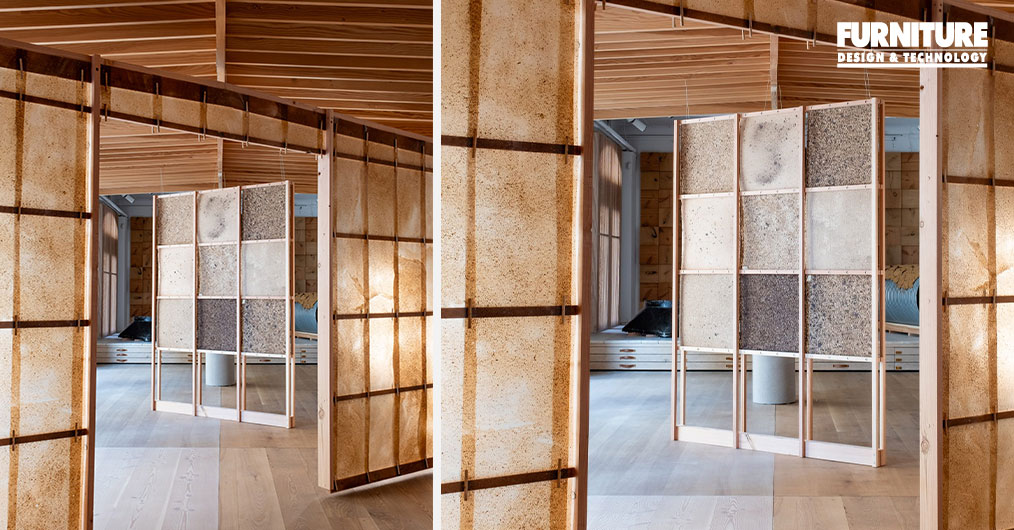
Danish firm Natural Material Studio recently developed four innovative biomaterials from sawdust, repurposed from the sawmill of flooring manufacturer Dinesen, to investigate the potential of transforming wood waste into useful building materials. These biomaterials were exhibited in the Dinesen showroom’s gallery space in central Copenhagen through an architectural installation named Smuld – meaning sawdust in Danish. This installation was designed in collaboration with local architecture practice Office Kim Lenschow. Know more about it on FURNITURE DESIGN AND TECHNOLOGY (FDT).
The installation features four brown-hued materials crafted from a blend of sawdust and natural wood binders, arranged as chunky geometric portals mounted on timber frames. Natural Material Studio utilized a range of sawdust, from fine dust to chunkier wood chips, leftover from production at Dinesen’s sawmill in Jels, Denmark. The first material is a flexible textile made from a mixture of finely sifted wood plaster and planer shavings, which the studio cast with natural latex derived from the rubber tree.
For the second material, the team plastered fine sawdust and cellulose onto wood fiber boards to form insulation. The third material, inspired by delicate, semi-translucent Japanese shoji screens, also combines finely sifted wood plaster and planer shavings. This mixture was cast into paper-thin, caramel-colored sheets. The fourth material represents the studio’s first attempt at creating a structural wood fiber panel for architectural use, held together with a binder made of lignin – the organic polymer that provides wood its strength and rigidity – developed in collaboration with the Danish Technological Institute.
This process allows the offcuts to become functional building materials despite their short fibers. The varying molecule lengths of the wood polymers, which are shorter than those of synthetic polymers, determine how long it takes for each material to biodegrade. These materials were reportedly arranged as large-scale, interactive portals in the Dinesen showroom to encourage visitors to observe and compare their qualities.
Image credit: Nikolaj Bonde
Furniture Design India and the magazine FURNITURE DESIGN & TECHNOLOGY (FDT magazine) are from the trusted 22-year-old media house of SURFACES REPORTER and PLY REPORTER.
FDT is a B2B monthly bilingual magazine from India that shares the pulse of the furniture business in India and connects the manufacturers, OEMS, product designers, architects, showrooms, designers and dealers.
Read More© 2026 Furniture Design and Technologies.. All Rights Reserved. Developed by eyeQ Advertising